|
|
|
Sort Order |
|
|
|
Items / Page
|
|
|
|
|
|
|
| Srl | Item |
| 1 |
ID:
184350
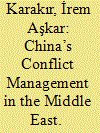

|
|
|
|
|
| Summary/Abstract |
China’s foreign policy toward the Middle East has traditionally been shaped by its national interests based on energy security, arms exports, and technology transfers. To complement its interest-driven regional policies, China has expanded its diplomatic contacts and promoted cultural ties. Over the last two decades, China has also engaged in conflict management in several regional issues, despite its declared commitment to nonintervention in other countries’ domestic affairs. This article aims to analyze China’s conflict management policies in the region, focusing on the Israeli–Palestinian conflict, Iran’s nuclear program and the Syrian conflict. Compared with other major external powers, prospects for China’s conflict management seem high given two significant advantages. First, unlike Western powers or Russia, China has not left any bitter taste in the region associated with colonialism, religious or historical engagement. Secondly, China has been careful not to take clear-cut sides in regional conflicts, making itself an ideal candidate to act as an honest broker. It is argued that despite these advantages, Chinese conflict management in the region has remained considerably modest and lacked any practical solutions to the critical problems.
|
|
|
|
|
|
|
|
|
|
|
|
|
|
|
|
| 2 |
ID:
144296
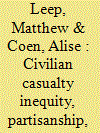

|
|
|
|
|
| Summary/Abstract |
Research into how civilian casualties influence public opinion largely focuses on citizens' support for the use of force by their own countries. This study explores how civilian casualties and partisan cues shape support for the use of force by an ally in a foreign conflict. Specifically, it assesses the effects of civilian casualty inequity – the uneven distribution of civilian casualties across two sides in a conflict – on Americans' support for Israel. Drawing on an original survey experiment conducted during the 2014 Israel–Gaza conflict, the article bridges work on inequity aversion theory, party identification, and social identity theory. It finds that civilian casualty inequity information reduces support for Israel, particularly among Independents. The study also finds that adding explicit partisan criticism cues to civilian casualty inequity information does not appear to induce motivated evaluations of Israel among Republicans or Democrats. An important implication is that under conditions of greater media coverage of civilian casualty inequity, Americans – particularly Independents – might become less supportive of Israel even in the absence of elite criticism of Israel.
|
|
|
|
|
|
|
|
|
|
|
|
|
|
|
|
| 3 |
ID:
150993
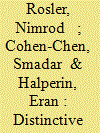

|
|
|
|
|
| Summary/Abstract |
The goal of the current research was to examine how discrete positive intergroup emotional phenomena affect conflict-related attitudes in different contexts of intractable conflict. We hypothesized that empathy, but not hope would be negatively associated with aggressive attitudes during escalation, while hope, but not empathy would be associated with conciliatory attitudes during de-escalation. In study 1, we examined our hypotheses within a correlational design in an emotion-inducing context, while in study 2 a two-wave survey was conducted during real-life events within the context of the Israeli–Palestinian conflict; a peace summit as well as a war. Both studies supported our hypotheses, thus indicating the unique, yet complimentary, contribution of each of the two emotional phenomena to the advancement of peace.
|
|
|
|
|
|
|
|
|
|
|
|
|
|
|
|
| 4 |
ID:
170194
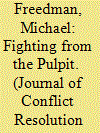

|
|
|
|
|
| Summary/Abstract |
Religious leaders greatly influence their constituents’ political behavior. Yet, it is unclear what events trigger nationalist attitudes among religious leaders and why this effect occurs more among some religious leaders rather than others. In this article, I examine the content of Israeli Rabbinic rhetoric during different military and political conflicts. Drawing on an original collection of Sabbath pamphlets distributed to Synagogues, I demonstrate that religious rhetoric is highly responsive to levels of violence for the Israeli–Palestinian conflict. I find that religious rhetoric and tone are more nationalist during conflict with the Palestinians and that this effect is mediated by religious ideologies toward the state. In contrast, religious rhetoric does not respond to military conflict in Lebanon or other internal Israeli political conflicts. These findings highlight under what conditions religious leaders infuse conflict with a religious tone, arguably making it harder to gain support for political compromise among the religious public.
|
|
|
|
|
|
|
|
|
|
|
|
|
|
|
|
| 5 |
ID:
168996
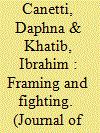

|
|
|
|
|
| Summary/Abstract |
How does the subjective conceptual framing of conflict impact the warring parties’ attitudes towards political compromise and negotiation? To assess strategies for conflict resolution, researchers frequently try to determine the defining dispute of a given conflict. However, involved parties often view the conflict through fundamentally distinct lenses. Currently, researchers do not possess a clear theoretical or methodological way to conceptualize the complexity of such competing frames and their effects on conflict resolution. This article addresses this gap. Using the Israeli–Palestinian conflict as a case study, we run a series of focus groups and three surveys among Jewish citizens of Israel, Palestinian citizens of Israel (PCIs), and Palestinians in the West Bank. Results reveal that three conflict frames are prominent – material, nationalist, and religious. However, the parties to the conflict differ in their dominant interpretation of the conflict. Jewish Israelis mostly frame the conflict as nationalist, whereas Palestinians, in both the West Bank and Israel, frame it as religious. Moreover, these frames impact conflict attitudes: a religious frame was associated with significantly less willingness to compromise in potential diplomatic negotiations among both Jewish and Palestinian citizens of Israel. Interestingly, differing frames had no significant impact on the political attitudes of West Bank Palestinians, suggesting that the daily realities of conflict there may be creating more static, militant attitudes among that population. These results challenge the efficacy of material solutions to the conflict and demonstrate the micro-foundations underpinning civilians’ conflict attitudes and their implications for successful conflict resolution.
|
|
|
|
|
|
|
|
|
|
|
|
|
|
|
|
| 6 |
ID:
159013


|
|
|
|
|
| Summary/Abstract |
Focusing on sport as an arena of struggle in the Israel/Palestine conflict, the current study traces, conceptually and historically, the way in which the Palestinian Authority in general, and Jibril Rajoub in particular, have shifted efforts toward the sporting arena in order to promote global awareness of the Palestinian case. In the current case study, the Palestinians were not successful at drawing attention to their political goals or in suspending Israel from Fédération Internationale de Football Association. However, their attempt emphasizes the ways in which conflicts had changed and the importance of images in the information age we live in. Conflicts today are very much battles of ideas and the information designed by the media. Alongside the military confrontations, an Image War is taking part in which each side tries to justifies its ideas, beliefs and actions.
|
|
|
|
|
|
|
|
|
|
|
|
|
|
|
|
| 7 |
ID:
181191
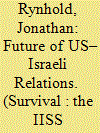

|
|
|
|
|
| Summary/Abstract |
The special relationship between the United States and Israel has been built on three pillars: shared strategic interests, the resonance of Israel in American political culture and the influence of the pro-Israel lobby. While the strategic pillar has been the most controversial, as many in Washington have viewed Israel as a strategic liability, the dramatic improvement in relations between Israel and America’s Gulf Arab partners has diminished this concern. But the once strong cultural and domestic political pillars are now under strain. In the wake of a sharp decline in sympathy for Israel within the Democratic Party, bipartisan support for Israel is now in doubt. The new Israeli government has the potential to arrest and reverse this decline. Without progress towards a two-state solution to the Israeli–Palestinian conflict, however, the challenge will remain.
|
|
|
|
|
|
|
|
|
|
|
|
|
|
|
|
| 8 |
ID:
143295
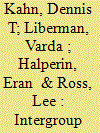

|
|
|
|
|
| Summary/Abstract |
Two studies examined the association of particular sentiments and political identities with Jewish-Israeli students’ responses to a generic plan to end the Israeli–Palestinian conflict and to narrower proposals for cooperative undertakings. Three composites—hatred/anger, compassion/empathy (reverse-coded), and guilt/shame (reverse-coded), and also a global composite combining these three sets of sentiments, were generally associated with negative responses to those plans and negative attributions about the wisdom and patriotism of supporters of those plans. Most of the associations between the global sentiments composite and the relevant responses continued to be statistically significant even after controlling for participants’ political identity. The interaction between the relevant sentiments and the putative authorship of one of the proposals was also investigated. Issues of generalizability, replicability, robustness, and of the relevance of mediational analysis, as well as implications for conflict resolution and potential directions for future research are addressed in a concluding discussion.
|
|
|
|
|
|
|
|
|
|
|
|
|
|
|
|
| 9 |
ID:
153233
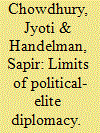

|
|
|
|
|
| Summary/Abstract |
This article challenges the convention that political-elite diplomacy should be the main instrument for coping with difficult violent conflicts. Its main argument is that a multifaceted approach to peace-making that creates equilibrium between political-elite diplomacy and public diplomacy has the greatest potential to generate a positive change in difficult situations of protracted violent conflicts where ordinary citizens are at the centre of the struggle. To demonstrate our central claim, the paper analyses three case studies that are considered to be significant cases within the realm of geopolitics and the history of modern statecraft: the Oslo Accord in the Israeli–Palestinian situation, the Dhaka negotiations that preceded the civil war between East and West Pakistan, and the Mandela–de Klerk interactions that led to a revolutionary transformation in South Africa.
|
|
|
|
|
|
|
|
|
|
|
|
|
|
|
|
| 10 |
ID:
165315
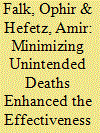

|
|
|
|
|
| Summary/Abstract |
Targeted killing has become a primary counterterrorism measure used by a number of countries in their confrontation with lethal threats. This article focuses on the impact of unintended deaths on the effectiveness of targeted killing. The article evaluates the effectiveness of targeted killings carried out in the Israeli–Palestinian conflict theater that resulted in unintended deaths, compared to the effectiveness of targeted killings where the intended target is the sole person killed. Using multivariate analysis, we demonstrate that targeted killings with unintended deaths were followed by a greater number of suicide bombings and associated casualties compared with targeted killings with no unintended deaths. Based on these findings, nations involved in such conflicts should strive to inflict as few unintended deaths as possible, not only because it is morally right, but also because it is more effective in mitigating terrorism.
|
|
|
|
|
|
|
|
|
|
|
|
|
|
|
|
| 11 |
ID:
153232


|
|
|
|
|
| Summary/Abstract |
This introductory article describes peace-making, peace-building and peace-keeping according to the specific characterization of the Israeli–Palestinian conflict. It presents the different articles in this special issue according to these categories and discusses critically their main theses. This methodology intends to help us gain a better understanding of the challenge of change.
|
|
|
|
|
|
|
|
|
|
|
|
|
|
|
|
| 12 |
ID:
152117
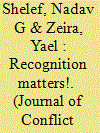

|
|
|
|
|
| Summary/Abstract |
Does international recognition of statehood affect support for territorial compromise among groups engaged in struggles for self-determination? We show that, contrary to skepticism about the impact of the United Nations General Assembly (UNGA), international recognition of statehood by the UNGA shapes mass attitudes toward territorial compromise. The impact of international recognition, however, is two-pronged. International recognition simultaneously increases support for partition as a strategy of conflict resolution and decreases support for compromise on the territorial terms of partition. We also suggest a logic to explain these impacts of international recognition based on the intuition that international recognition should improve the bargaining position of the newly recognized group. We demonstrate that international recognition has an impact on mass attitudes of groups in conflict using a combination of a panel survey and survey experiment assessing the impact of the 2012 UNGA recognition of Palestine. This study is the first to show that international recognition can shape mass attitudes toward conflict.
|
|
|
|
|
|
|
|
|
|
|
|
|
|
|
|
| 13 |
ID:
161598
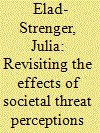

|
|
|
|
|
| Summary/Abstract |
Past research has produced convincing evidence for the association between perceived societal threat and political conservatism. Based on the view of political worldviews and threat perceptions as multifaceted constructs, the present study suggests that certain types of perceived threat are actually associated with the endorsement of more politically liberal positions. Employing a three-wave naturalistic design, we examined the unique longitudinal effects of perceived threats from real-life political events that challenge either liberal or conservative values, on conflict-related attitudes, using a nationally representative sample of Jewish-Israelis (N = 437). Consistent with our hypotheses, perceived threat from events that challenge conservative values was associated with increased militaristic attitudes and decreased willingness to compromise for peace over time, whereas perceived threat from events that challenge liberal values was related to decreased militaristic attitudes and increased willingness to compromise for peace over time. Theoretical and practical implications of these longitudinal effects are discussed.
|
|
|
|
|
|
|
|
|
|
|
|
|
|
|
|
| 14 |
ID:
145991
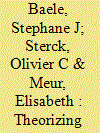

|
|
|
|
|
| Summary/Abstract |
While recent research has demonstrated the key role played by emotion in conflicts, the interplay between the individual and collective dimensions of this variable has not yet been fully conceptualized and satisfyingly measured. Focusing on the 2011 Palestinian statehood bid at the United Nations and the United Nations Educational, Scientific and Cultural Organization, this article highlights the circular character of group-based emotional dynamics and stresses the importance of “emotional worldviews” and “emotional configurations.” We subsequently provide an innovative, robust, and repeatable quantitative method for the direct measuring of these two components. This threefold contribution—theoretical, methodological, empirical—completes recent models (chiefly the appraisal-based framework) and unfolds new research avenues for the study of the role of individual and collective emotions in conflicts.
|
|
|
|
|
|
|
|
|
|
|
|
|
|
|
|
| 15 |
ID:
160526
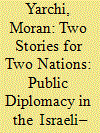

|
|
|
|
|
| Summary/Abstract |
A substantial part of asymmetric conflicts is the “image war” that takes place in the foreign media. This study examines the circumstances that explain the degree to which political actors successfully promote their preferred frames regarding the conflict in which they are involved to the foreign press. The study examines Israel and the Palestinians’ ability to promote their messages in various events over the last decade. Seven factors were examined, divided into three groups: focal event factors, political context factors, and message context factors. Separate examination of each predictor, followed by analysis of their shared effect, reveals that most factors have an impact on how successful political actors are at promoting their preferred frames to the foreign press. Our findings suggests that the media place greater emphasis on focal event factors when covering conflicts, and that events have a greater impact than cultural assumptions in terms of how foreign media frame news stories.
|
|
|
|
|
|
|
|
|
|
|
|
|
|
|
|
|
|
|
|
|